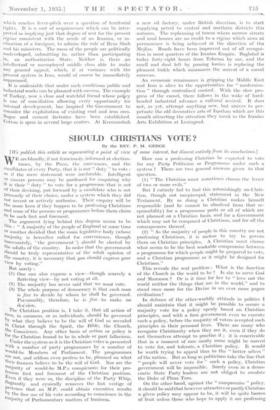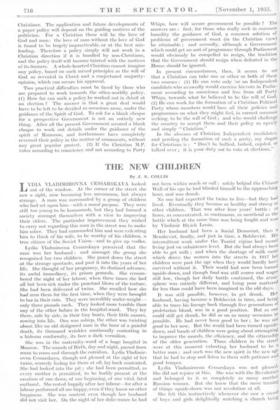SHOULD CHRISTIANS VOTE ?
By the REV. P. M. GEDGE [We publish this article as representing a point of view of some interest, but dissent entirely from, its conclusions.] E areblancly, if not ferociously, informed at election- times, by the Press, the canvassers, and the candidates of every Party, that it is our " duty " to vote : RS if the mere statement were irrefutable. Intelligent or sincere persons may be pardoned, for enquiring why it is their " duty " to vote for a programme' that is not of their devising, put forward by a candidate who is not primarily of their choice,' under a system which they did out invent or actively authorise. Their enquiry will be the more keen if they happen to be professing Christians 'and none of the persons or programmes before them claim 19 be such first and foremost. .
• . The argument lying behind this dogma seems to be this : " A majority of the people of England at some time Pr another decided that the main legislative body (whose !Majority is hereafter called for convenience, though jaaccurately, ' the government ') should be elected by the adults of the country. In order that the government should be truly representative of the adult opinion of The country, it is necessary that you should express your Ilew by voting." But surely : (1) One can also express a view—though scarcely a flattering view—by not voting at all. (2) The majority has never said that we mud vote. (3) The whole purpose of democracy is that each man is free to decide by whom he shall be governed. Piesumably, therefore, he is free- to make no de c Ision. , The Christian position is, I take it, that all action of V1en, in common, or as individuals, should be governed 21 what they believe to be the will of God as revealed i'll Christ through the Spirit, the Bible, the Church, the Conscience. Any other basis of action or policy is fur the Christian bound to be in whole or part fallacious.
tinder the'system as it is the Christian voter is presented with a number of party programmes by a number of :would-be Members of Parliament. The programmes are not, and seldom even profess to be, planned on what their framers believe to be the will of God. Nor are the majority of would-be M.P.s conspicuous for their pro- fession first and foremost of the Christian position. i'-'ven if they were so, the discipline of the Party Whip, flagrantly and cynically removes the last vestige of pretence that an M.P. .could obtain executive results ''''Y the free use of his vote according to conscience in the majority of Parliamentary matters of business. How can a professing Christian b6 expected to Vote for any Party Politician or Programme under such a system ? There are two general answers given to that question. (1) " The Christian must sometimes choose the lesser of two or more evils."
But I entirely fail to find this astonishingly un-ChriS- tian, though not unepiscopal, statement in the New Testament. By so doing- a Christian makes himself responsible (and he cannot be absolved from that re. • sponsibility) for a programme parts or all of which are not planned on a Christian basis, and for a Government which may not be composed of Christians, and for all the consequences thereof. (2) " As the majority of people in this country are not .professing Christians, • it is useless to try to govern them on Christian principles. A Christian must choose what seems to be the best workable compromise between a programme for which people might be prepared to vote, and a Christian programme as it might be designed for Christians."
This reveals the real problem : What is the function of.the Church in the world to be ? Is she to serve God and Mammon ? Or is it time for her to " love not the world neither the things that are in the world," and to stand once more for the Divine in an ever more pagan civilisation?
In defence of the other-worldly attitude in politics I should maintain that it might be possible to secure a majority vote for a policy openly based on Christian principles,• and with a firm government even to execute such a policy, before the majority of voters accepted such principles in their personal lives. There are many who recognise Christianity when they see it, even if they do not themselves attempt to practise it ; it is conceivable that in a moment of rare sanity some might be mewed to vote for, and tolerate, a Christian policy. It would be worth trying to appeal thus to the " better selves " of the nation. But as long as politicians take the line that " people will never vote for " such a policy, Christian government will be impossible. Surely even in a demo- cratic State Party leaders are not obliged to emulate the Duke of Plaza Toro.
On the other, hand, against the " compromise " policy, it should be said that however attractive or partly Christian a even policy may appear to be, it will be quite barren of fruit unless those who hope to apply it are professing Christians. The application and future developments of a paper policy will depend on the guiding motives of the politician. For a Christian these will be the love of God and man : the love of man without the love of God is found to be largely impracticable, or at the best mis- leading. Therefore a policy simply will not work in a Christian direction if it is handled by non-Christians, and the policy itself will become tainted with the motives of its framers. A whole-hearted Christian cannot imagine any policy, based on such mixed principles as the will of God as revealed in Christ and a conjectured majority- opinion, which can secure his approval.
Two practical difficulties must be faced by those who are prepared to work towards the other-worldly policy. (1) How far can such a policy,be worked out in detail at an election ? The answer is that a great deal would have to be left to be decided as occasions arose, under the guidance of the Spirit of God.. To ask for a blank cheque for a prospective Government is not an entirely new thing. After all the present Government secured a blank cheque to work out details under the guidance of the spirit of Mammon, and furthermore have completely reversed their policy in the matter of armaments, without any great popular protest. (2) If the Christian M.P. 'totes according to conscience and not according to Party Whips, how will secure government be possible ? The answers are : first, for those who really seek in common humility the guidance of God, a common solution of problems of government must (in the Christian view) be attainable ; and secondly, although a Government which could get no sort of programme through Parliament would obviously be compelled to resign, the tradition that the Government should resign when defeated in the House should be ignored.
In present circumstances, then, it seems to me that a Christian can take one or other or both of these two courses (1) He can vote only for -an Independent candidate who avowedly would exercise his vote in Parlia- ment according to conscience and free from all Party Whips, towards what he believed to be the will of God: (2) He can work for the formation of a Christian Political Party whose members would base all their policies and programmes on what they might feel, in earnest common seeking, to be the will of God ; and who would challenge the country to accept them and their policy as openly and simply " Christian." In the absence of Christian Independent candidates, and pending the formation of such a party, my slogan for Christians is : " Don't be bullied, bribed, cajoled, or talked over ; it is your duty not to vote at elections."



























































 Previous page
Previous page